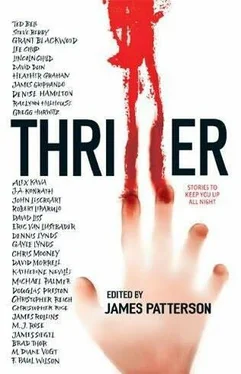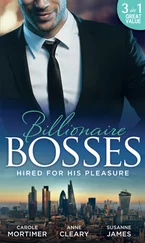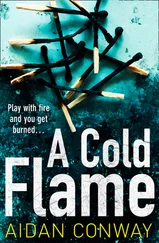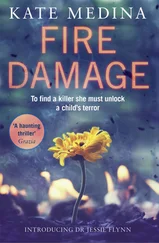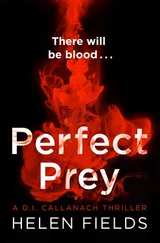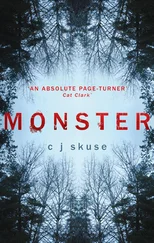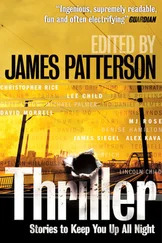"Killing myself, Dad."
He had come to stand by his son's side. "Why would you want to do that?" "Why do you think?"
Once again, he wasn't alarmed; once again, he understood. He also felt out of sync with the world, estranged and a stranger, sometimes even to himself.
He'd put his hand on Christopher's shoulder and felt as if it were his own shoulder. "Don't concern yourself, son. Everything changes."
"But it won't get better."
"That, no one can say."
Christopher had nodded and, closing the window, had said, "Thanks, Dad. Thanks for not lying to me."
For all its impotence, the air conditioner roars like the jet engines of the plane that brought him here. With the hot stream lifting the hairs on his forearms and chest, he looks down at his bare feet and thinks of death. There is nothing else left to think about, and now he wonders whether there ever was.
When had it become apparent that there was something wrong with Lily? Even though he has racked his brains for months, he hasn't been able to quite pinpoint the moment. Perhaps there was no one moment, perhaps, as in all other things in life his wife's demise was a death by ten thousand cuts. Because, until the very end, she had been the consummate actress. He was uniquely qualified to see her ruse-he who was closest to her, who should not have been able to be objective because she was his wife and his beloved. But she was to him a great, intricate clock, whose every tick, every tock he knew inside and out.
What eventually caught his attention were the tiniest details, so minute that not even Christopher had been aware of them. Only he, who was obsessed by her, who fetishized her-only he knew. But, really, he didn't know-not at first, anyway. But slowly the tendrils of suspicion took hold of him and would not let him go. So he began to pay special attention.
He recalls the time he went into her closet. He always went into her closet to search on his hands and knees for bits of her- a stray nail clipping or a strand of pubic hair. Eyelashes he loved best, not only for their exquisite scimitar shape but because they were something so intimate he could almost feel her heart beating when he held one on the tip of his finger. She existed in that one tiny follicle, as if she were a genie who had been put back into her lamp, to be with him for all time.
He'd made a light box of mahogany with beveled edges and mitred corners into which he put an 8x10 photo he'd taken of her on their honeymoon. Her eyes looked dewy and, behind the halo of her hair spread the fronds of Balinese palms, slightly out of focus, looking like Tjak, the Balinese bird with a human face. Behind this photo, he placed the ephemera he periodically collected from her closet, and some of them tended to cast unidentifiable shadows across her face.
That day, however, he found something else, a tiny scrap of paper with a mark on it. He thought it must be a bit of writing, though it wasn't English or for that matter any language that used Roman letters. The mark looked like a rune to him, something ancient and therefore unknowable. Thus his suspicions, having been previously awakened, were aroused.
In some ways, she was too perfect, and in light of his suspicions, her absolute perfection proved the deepest fissure in her simulation. In all ways, she was the perfect wife and mother. She cooked gourmet dinners, provided him with astonishingly imaginative sex, was always there for Christopher when he was ill or low, was so kind to his girlfriends that many of them kept in touch with her long after their liaisons with him had ended. She never complained when her husband went away on business trips and was grateful for the same treatment when she went away on her business trips.
The facade was complete, and life went on precisely as it should have. But nothing in life is perfect and, as Christopher was quick to understand, happiness is as ephemeral as a cherry blossom. In fact, it is his own opinion that happiness is illusory.
Take, for instance, the sex. While it had been true that in college he'd left a string of girlfriends behind him, his serial affairs were not at all motivated by sex, to which he had been indifferent. No, he'd been looking for something. At first, he hadn't known what it was, he only knew that each girl in her own way had disappointed him. Later on, it occurred to him that he was looking for a shadow, a kind of twin to himself, who possessed the qualities he himself longed for but did not have.
Lily had performed on him the most elaborate erotic rituals. It was not surprising that he came to enjoy them, then to actually crave them, but his burgeoning desire bound him to her, and this bitter revelation plunged him into despair.
As soon as he was able to see through the mirage of happiness everything changed. Lily, as it transpired, worked for the Agency, not Fieldstone Real Estate or, latterly, March & Masson Public Relations. Or, rather, she did work at the offices of Fieldstone and, latterly, March & Masson, but both entities were owned and operated by the Agency, stage sets as artfully aping reality as any of the ones he had designed.
There is a scratching at the hotel-room door, and he turns, facing his fate as if it were the lens of a camera. Let them come, his enemies, he is ready for them now, for if they break in they will find Harold Moss or Max Brandt. It will be of no moment to him and a bitter disappointment to them. He himself is gone, dissolved like candle wax beneath a flame.
Where was he? Oh, yes, Lily. Of course, Lily. His beginning and his end.
"I know what you want from me," she had said at the outset of their relationship, and she was right, she could see through to the hollow core of him. In fact, he is convinced this is why she married him. Since his core was hollow, she could fashion him into her ideal lover. She could turn him inside out and it wouldn't matter, because there'd been nothing there to begin with.
Years later, he had said to her, "What is it you want from me?"
It was night and they were in bed, naked and sweaty from their acrobatic exertions. She was still on top, reluctant to dismount. The night was still, as it always was when they made love, as if it had ceased to exist.
"I should have thought that was obvious. I love you."
A lie, but not, perhaps, the first one she'd told him, which might have been, "Don't look at me like that, it gives me the creeps," or then again, while he was making her up, while he was killing her, "You're nothing to me. I don't care whether you live or die." And then, reborn on stage, she had glanced into the wings at the precise spot where she knew he stood for each performance and had smiled at his shadow.
Actors were, of course, adept at creating their own reality, but lying, well, that was another matter entirely. It seems to him now, standing on the furthest shore of his life, in the stifling heat of summertime when it should be winter, that Lily became addicted to lying as others become addicted to heroin or cocaine. He suspected she had got high from lying-no, not suspected, knew, because in molding him she had given herself away, and he had known her as deeply and profoundly as she had known him.
Perhaps, in the end, this is how she had come undone-not her lying to him, but the nature of her lies. And when the lies had altered, subtly but definitely, he had known. He'd followed her on one of her business trips and had seen her put something in a painted birdhouse affixed to a crooked wooden post out in the Maryland countryside. She'd left, but he'd stayed to watch. Twenty minutes later, a car had pulled up and a man got out. The man went straight to the birdhouse and when he'd pulled out whatever it was Lily had left for him, he depressed the trigger of his digital camera at 10X zoom.
The resulting photos he showed to the people at the Agency, who became immediately agitated.
Читать дальше
